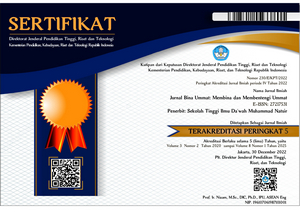THE IMPLICATIONS OF LIFELONG EDUCATION ON IMPROVEMENT OF MORALS AND SELF POTENTIAL
In Belief of Islam and Guthrie's Thought
DOI:
https://doi.org/10.38214/jurnalbinaummatstidnatsir.v6i1.179Keywords:
Lifelong Education, Morals, Self-PotentialAbstract
This study aims to analyze implications of lifelong education on morals and human potential in Islamic views and Guthrie thought. The method carried out in this study is a literature review, which is a research approach that reviews literature both with literature studies and direct observations in the field. The results of this study show that lifelong education be a concern for many parties. When related in a wide area, Islamic conception and western scientist or philosopher give attention about the urgency of lifelong education although with different approaches. The implications that arise from lifelong education are the development and improvement of morals and the potential of human personality in accordance with its nature and essence, fostering awareness that the process of growth and development of human personality is alive and dynamic, and can increase human life expectancy.
Keywords: Lifelong Education, Morals, Self-Potential
Published
Issue
Section
This work is licensed under a Lisensi Creative Commons Atribusi 4.0 Internasional.
Authors who publish with this journal agree to the following terms:
- Authors retain copyright and grant the journal right of first publication with the work simultaneously licensed under a Creative Commons Attribution License that allows others to share the work with an acknowledgment of the work's authorship and initial publication in this journal.
- Authors are able to enter into separate, additional contractual arrangements for the non-exclusive distribution of the journal's published version of the work (e.g., post it to an institutional repository or publish it in a book), with an acknowledgment of its initial publication in this journal.
- Authors are permitted and encouraged to post their work online (e.g., in institutional repositories or on their website) prior to and during the submission process, as it can lead to productive exchanges, as well as earlier and greater citation of published work (See The Effect of Open Access).




